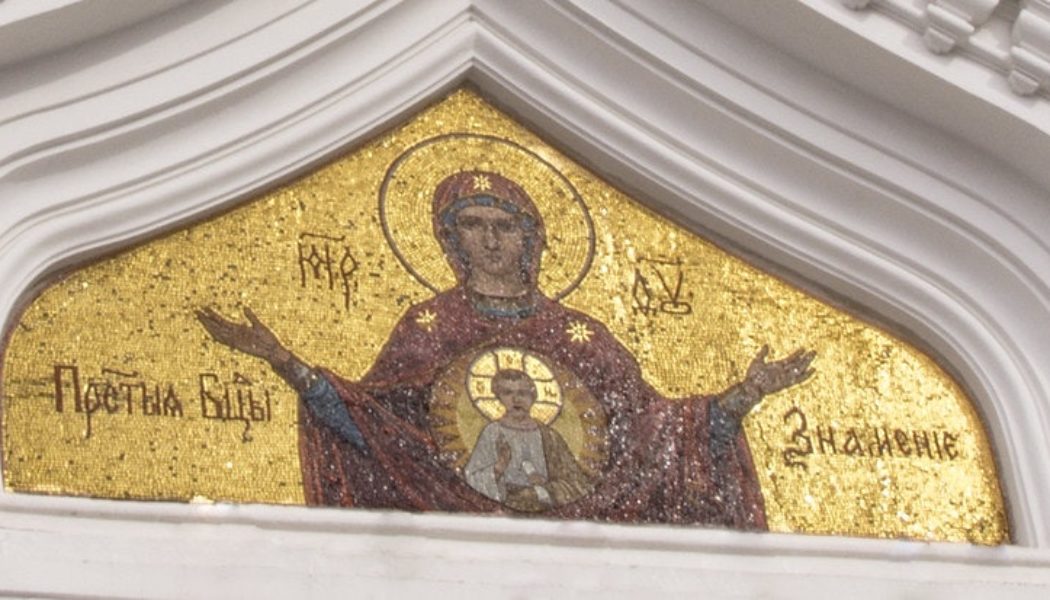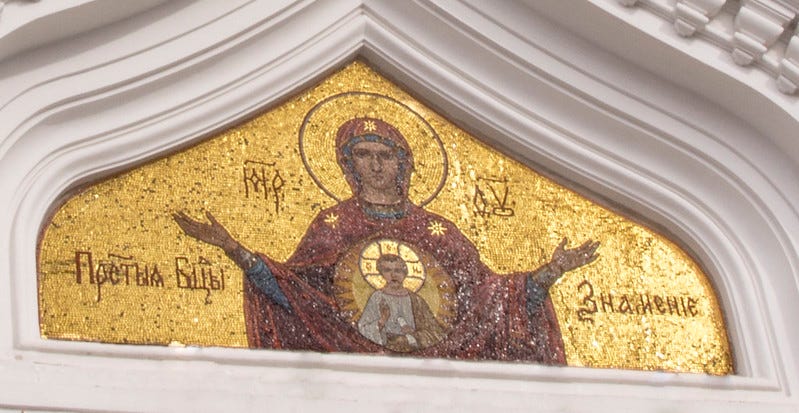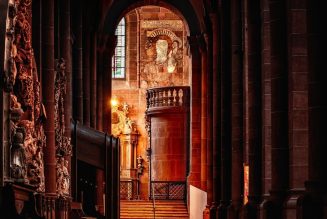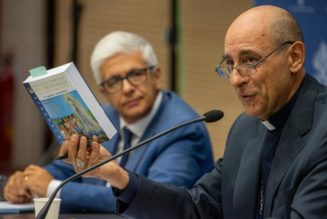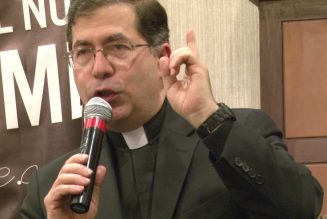Happy Friday friends,
And a very happy feast of the Annunciation to you all. There’s obviously so much to love about this particular feast, and the simplicity and magnitude of Mary’s fiat is, for me at least, a constant challenge to fully understand as I struggle towards echoing it faintly in my own life.
As much as the content, I find the timing of the feast wonderful. It’s a feasting Friday, of course, and who doesn’t love one of those?
But looking up a little from the weekly horizon — It is, I think, beautiful that we ring the first metaphorical bell to herald the coming of Christ at Christmas in the middle of Lent — even as we are already longing for Easter.
One of the great cants of pop psychology culture is to be “present” and “grounded in the moment.” That’s fine, I suppose, to the extent that anything means anything at all in the vacuous cult of “mindfulness.”
But the reality of the Church is that we are a pilgrim people just passing through this world — we don’t “live in the moment,” we live looking always forward, our eyes locked firmly on the metaphorical East, waiting for the breaking dawn of the coming of Christ.
Even as we spend time in the spiritual desert of Lent, and begin preparations for Holy Week and the death and resurrection of Jesus, the liturgical year is already whispering in our ear that Christ will be born of Mary.
I love that.
It is also consecration day.
Bishops around the world will be joining Pope Francis in the act of solemnly committing the world, and especially Russia and Ukraine, to Our Lady’s Immaculate Heart.
It is set to be an act of extraordinary solemnity, and also of powerful communion among the world’s bishops, and faithful, together with the pope.
—
Joining in the consecration, too, will be Catholics in Moscow’s own Cathedral of the Immaculate Conception. The Russian Greek Catholic Church is just one of the six or more Churches impacted by the crisis in Ukraine — and the pope’s act of consecration, which is an act of spiritual authority, will likely reset the ecumenical board.
As JD argues in an analysis this morning, Patriarch Kirill is likely to be more than a little nettled by Francis entrusting what he sees as his spiritual Russkiy-mir to Mary, and it could well close down talks of further meetings between the two leaders.
That said, with the Russian Orthodox Church ever more isolated, it could mean that some moves within the Catholic Church— like the appointment of a patriarch for Ukraine’s Catholics, and a bishop for Russia’s — could suddenly be on the table.
You can read JD’s whole analysis here.
Also in the news
Bishop John Brungardt will return to ministry leading the Diocese of Dodge City, Kansas, after a nearly 14-month voluntary leave of absence.
The bishop is an outlier, though not entirely unique, in that he decided to step away from ministry while he was investigated, in marked contrast to several U.S. bishops who have elected to remain in ministry while the Vatican conducted investigations under the norms of Vos estis lux mundi.
Neither the diocese nor the KBI have indicated when the alleged abuse might have occurred, and Brungardt has been unflinching in defending his innocence. Some Kansas priests told us they believe that Brungardt chose to step away from ministry while he was investigated as a gesture of solidarity with priests, who are ordinarily removed from ministry as soon as a plausible allegation against them is raised, and as an expression of respect for the alleged victim and the criminal investigation itself.
If that is the case, well done him.
—
While the world is cheering the heroic efforts of the Ukrainian people to fight off their Russian invaders, the reality is that one month in, the human crisis in the country is only getting worse.
In his latest dispatch, our Ukrainian correspondent, Anatolii Babynskyi, spoke to families displaced by the violence, and to the Catholics who are trying to offer them help on the ground.
But the work of Ukrainian aid workers, clergy, and volunteers to help refugees – their own countrymen – is inspiring and encouraging. That isn’t easy work.
One small Caritas office in Kolomyia provided shelter to 300 refugees during the first weeks of the war. Here is what its deputy director had to say:
“I have never seen such fear in people’s eyes. When the first refugees from Izium in eastern Ukraine came to us, they were afraid to enter the building. They could not even say a word and immediately began to cry. They were afraid of everything; they expected danger from every side.
“People come to us in despair. But they do not give up, they have hope in their eyes, and it gives us strength here. This situation is a test of trust in God for me – can I live with Him every day, even in such conditions?”
A sordid affair
We reported this week on a parish in the Diocese of Rochester which sold a closed church to the Bhakti Marga Hindu movement — the building, and adjacent former convent, are to be renovated into the first U.S. temple of the Hindu group.
It’s a regrettable reality that with congregations shrinking, dioceses have to make hard choices about parish mergers and church closures. In that context, the case of the former church of Our Lady of Lourdes is not unique. Canon law allows for churches, in certain circumstances, to be deconsecrated and relegated to “profane, but not sordid use.”
What is unique is the decision to sell this intact church building to a group intending to convert it into a Hindu temple and ashram.
The statue of Our Lady, they said, was going to move into the former convent building and be set next to a statue of Kali, the Hindu goddess of death.
I have seen former churches converted into apartments, offices, even a restaurant, and each one grieves me. Those are all definitely profane uses for what was once sacred, though I cannot call them “sordid,” which is usually understood canonically as a sacrilegious, immoral, or scandalous purpose.
But installing statues of what Scripture would call “other gods,” along with 1,000 sacred rocks, in the very space where the holy sacrifice of the Mass was offered?
Well, that strikes me as both sacrilegious and a scandal.
That’s what we reported on Wednesday.
It’s not clear how much about the future of the building was known to the diocesan bodies required to sign off on the church’s sale. The diocese told us it would look into our questions about how a church came to be sold to a group planning to convert it to a Hindu temple, and we will keep you posted..
I can only hope that diocesan officials and consultors didn’t understand the buyer’s plans, or were acting on imperfect information. I sincerely hope the Hindu group wasn’t treated as some kind of preferred bidder, out of a misplaced desire to see the building kept for some kind of “religious purpose.”
It’s one thing for Christians, and for the Church, to maintain respectful relations with other faiths.
It is quite another when that respect tips into religious indifferentism, and becomes blind to what it means that a church would be sold knowingly in order to become a pagan temple.
No, he didn’t
I have lost track of the number of times I have read that Pope Francis has “changed the rules” during the Vatican financial trial, or that he “dispensed” prosecutors from “following the law” during the two year investigation into the Secretariat of State’s financial fiasco, kneecapping the right to due process as he did so.
Whether in supposedly factual reports or comment pieces, from people supportive of the prosecution’s efforts or insisting that Cardinal Becciu and his co-defendants are being railroaded, these have become stock phrases in media across Italy, Europe, and the U.S.
They are also, pardon my exasperated French, total bollocks, as I tried to show as simply as possible in an analysis this week.
The claim that the pope interfered to limit due process is an argument first made by defense lawyers in a bid to have the trial dismissed, which was roundly rejected by the judges in a publicly available 40-page decision, but which was not widely read in full, or reported in detail.
Instead, what has stuck in the public consciousness seems to be that, by signing four rescripts (special legal authorizations) for the investigation, the pope did something to tip the scales in favor of the prosecution and away from due process for the defense. Given that the text of these four rescripts is out there to be read, I find this maddening.
To be sure, the Vatican financial scandal and trial is a sprawling affair, and keeping abreast of all the details is a daunting prospect for anyone. But the casual adoption as “fact,” by all sides, that the pope has monkeyed about with the judicial process is not a small issue — especially since it simply doesn’t hold water.
If it becomes a settled assumption that Francis did something to tip the scales of justice against the defendants — and again I see no basis for this argument — it will mean no decision by the Vatican court will be accepted as true justice, and, by extension, no one can trust the Holy See to run its own sovereign affairs.
The problem is, the claim of extra judicial papal interference suits too many agendas on all sides: first among them the defendants, of course, whose legal teams and supporters in the press have deployed a clear and consistent strategy of undermining the idea that anyone can get a fair trial in Vatican City.
It also appeals to the very real constituency in Italian politics and media who think the Vatican’s legal and diplomatic independence is an anachronism that should be eliminated.
But the idea has also found favor, or at least apparent acceptance, among many commentators reflexively in favor of the trail and supportive of efforts to clean out the Augean stable of the Secretariat of State’s administrative office.
It’s possible that they simply haven’t got the time to fact-check the claims. Or, perhaps, they fail to see the significance of what they are conceding, and think it’s just a useful rhetorical nod to appear fair minded about a controversial and complicated story.
Really, though, I think a lot of it boils down to people’s priors about the pope. Francis has faced criticism for having personal blindspots (Bishop Zanchetta, for example), and for sometimes appearing to legislate on the hoof. And I think more than a few people are simply prepared to take it on trust that he must have done something unorthodox in this trial.
How is this legal?
Here in Washington this week, the center ring of our never-ending political circus was occupied by confirmation hearings for Judge Ketanji Brown Jackson, President Biden’s nominee to the Supreme Court.
Few things are less illuminating than public sessions involving Senators Mazie Hirono and Ted Cruz. Indeed, it wouldn’t surprise me to learn that the committee room has its own event horizon, beyond which time passes more slowly, like some kind of intellectual black hole.
I’ve spared myself watching the sessions as much as possible, but I have to say that the lawyer in me bristles at the fact that they are happening at all. Not because of anything having to do with the nominee.
Instead, my concern is about procedural law. It usually is, but hear me out.
How, I ask you, can it be possible, legally speaking, for the Senate to hold confirmation hearings on a nomination for a position that is not vacant?
I understand Justice Breyer has said he intends to retire, and that he’s undertaken to do so once his successor is confirmed — but this seems like a legal and logical snake eating its own tail.
How can you confirm someone to a position that is not vacant? More to the point — so far as I am aware, nothing prevents Breyer from changing his mind at any time.
In canon law, such a situation is unthinkable — and is specifically outlawed, as a matter of fact.
“The provision of an office which by law is not vacant is by that fact invalid and is not validated by subsequent vacancy.
A promise of some office, no matter by whom it is made, produces no juridic effect.”
I spoke to a friend who teaches at a fairly top-tier law school about this.
I was assured that however anathema this whole process is to a Roman legal mind, this is totally legitimate here in the States — the Senate is, in effect, providing its advice and consent to the idea of Jackson’s nomination, which doesn’t technically occur unless and until Biden names her to an actual vacancy.
Ok, I guess.
But, I asked my friend whether anything prevents a presidential candidate from campaigning on a slate of two, three, or more named nominees for the Supreme Court, and then seeing them approved by the Senate nunc pro tunc in the first months after taking office, just in case a vacancy or two comes up later?
Well, propriety and tradition would frown on that. But legally, I’m told a candidate could do exactly that — at least until the midterm elections return a new Congress.
The legal situation here seems to me to give Supreme Court justices a considerable amount of power over who exactly will succeed them, which isn’t supposed to be a perk of a lifetime appointment.
It’s easy to conceive that, much as Breyer has said he’ll resign once the Senate confirms his replacement, another justice could condition an offer to resign on the confirmation of the right kind of replacement nominee, or even a named successor.
Again, this would be politically grotesque if done in public, and against all custom and decorum — but forgive me if I don’t find those to be reassuring bulwarks in the absence of a clear legal impediment.
Now, I am not a qualified American lawyer, and perhaps I am merely showing a canonist’s cultural ignorance of the beauty of the common law system. But all I can say is that you don’t get this nonsense in the Codex Iuris Canonici.
See you next week.
Ed. Condon
Editor
The Pillar
**When this went out, I said the liturgy of consecration would begin at 17.00 Roman time, 11am on the East Coast.
It turns out that because Europe doesn’t observe Daylight Savings Time until next week, it’s only a five hour time difference. You all know my feelings about DST. This is just further proof that I am right: it’s a godless and unnatural action that is costing lives, and now quite possibly souls, too.
Join Our Telegram Group : Salvation & Prosperity
